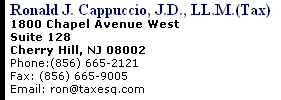|
When it comes to building wealth
on a tax-deferred basis, the benefits of a 401(k) plan are too
good to pass up.
If your company doesn't have a 401(k)
plan, now is a good time to start one. If you already have a
plan in place, there are ways to improve it and protect
yourself from unpleasant surprises. Here are eight tips for
success:
1. Don't put all your
eggs in the safest basket. Some CEOs think the best way to comply with
federal rules is to place all the 401(k) money in guaranteed
vehicles, such as certificates of deposit or Treasury bills.
But inflation erodes the value of these fixed-income vehicles.
And by only holding the safest investments, you can violate
Department of Labor suitability and diversification rules.
2. Formally document the plan's goals.
Have an "Investment
Policy Statement" that describes performance standards and
realistic goals for the money manager. If the Department of
Labor audits your plan, regulators scrutinize the decision
making process more closely than the actual performance. All
your mutual funds don't have to be performing in the top 25
percent but you do have to show that you're being prudent.
3. Make sure paperwork is filed on time.
This doesn't have to
be cumbersome if you get professional help. Make sure you file
reports on time and maintain documentation to show you have a
defined process for selecting and monitoring investments. Some
small companies set up committees of two or three people to
oversee the investments using rating services, such as Lipper
and Morningstar. The committees then prepare memos about the
evaluations for the company files.
4. Educate staff to magnify your benefits.
Federal 401(k) rules
reward company owners — presumably the best-paid employees —
for encouraging lower-paid employees to participate. It works
this way: The most an employee can contribute to a 401(k) is
about 20 percent of compensation. If lower-level staff members
sock away only 10 percent of their salaries, then higher-paid
employees are limited to about the same 10 percent. Make sure
your workforce is aware of the 401(k) tax breaks and the
ability to borrow against assets to pay for college tuition or
the down payment on a house. A low percentage of participation
may indicate you aren't providing enough educational
materials.
5. Consider automatic enrollment to boost
participation. Some company 401(k) plans now have a feature that
automatically enrolls new employees when they're hired without
requiring them to submit a request to join. Under this option,
a pre-determined percentage of employees' pay (generally 3
percent) is deferred as soon as they become eligible for the
plan. If they don't want to participate, they must request to
be excluded by filing a form, calling a phone number or going
to an online address.
6. Remember, you can be personally liable for
violations. If
you run afoul of the law, it's not just the corporation that
can suffer. CEOs and other executives who are made trustees
can be held personally responsible for ERISA violations.
Individual trustees can be required to pay fines out of their
personal assets and the corporation is barred from helping.
7. Build your nest egg by contributing to
employees' accounts. By having the company "match" 25 cents, 50 cents, or
even a dollar for every dollar that employees put into their
401(k) plans, you can increase your own tax-deferred growth.
Plus, matching contributions can help recruit, retain and
reward good employees. In 2007, the maximum amount you can set
aside in a 401(k) plan tax-deferred is $15,500 (up from
$15,000 in 2006).
8. Hire a knowledgeable adviser.
Some small business
owners believe that general lawyers or other third-party
administrators can provide adequate guidance. But this can
lead to compliance problems with federal regulations. Make
sure your plan is reviewed by a professional who is
knowledgeable about the Employee Retirement Income Security
Act (ERISA). Call Ronald J. Cappuccio, J.D.,
LL.M.(Tax) at (856)
665-2121 | . 
| 










